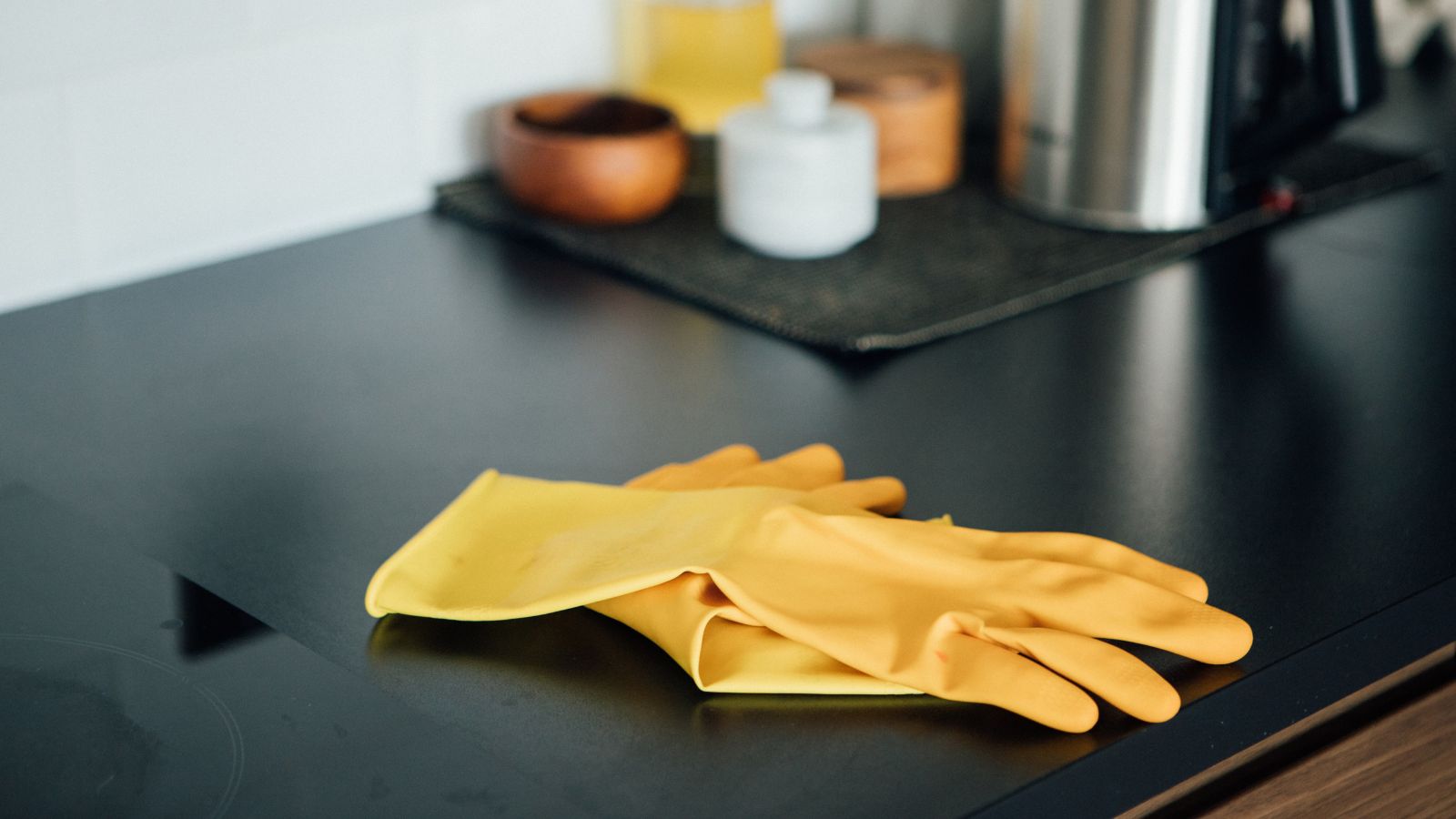How to clean when feeling overwhelmed – 11 ways to spruce up your space without the stress
Cleaning and clutter don't need to cause stress, here’s how professionals clean when feeling overwhelmed


- 1. Start small
- 2. Find your ideal work hour
- 3. Stick to a schedule
- 4. Try habit stacking
- 5. Break tasks down into smaller, sustainable tasks
- 6. Fake it till you make it
- 7. Be realistic about your goals
- 8. Try the 20-10 routine
- 9. Work with your imagination
- 10. Try a trash sweep
- 11. Remember to reward yourself
- FAQs
Whether cleaning makes you feel overwhelmed, or you are already overwhelmed to begin with, getting chores done can feel like an uphill battle – especially when we feel pressured to keep up with social media cleaning trends.
Even the professionals can feel the pressure to keep cleaning sometimes, with clever cleaning tips not always enough to help you power through your to-do list.
We asked them to share their tricks for cleaning when it all feels too much.
How to clean when feeling overwhelmed
Although the act of cleaning may be overwhelming, studies have proven that a clean house makes you happier, and decluttering can change your life. As a result, understanding how to push through periods of low mood and clean and tidy when overwhelmed is vital to help lift your spirits.
Here is how to take it a day at a time.

1. Start small
There is mixed advice when it comes to cleaning your home, with some suggesting diving in at the deep end. But if you find yourself struggling, sometimes it is worth starting smaller, tackling tasks to help you clean a house fast, and working your way up to the more daunting jobs, suggests Will Cotter, cleaning expert and founder of FreshSpace.
‘When you rise in the morning and take a few minutes to neatly arrange your bedding, you're immediately greeted with a sense of order and tidiness. This sense of accomplishment sets a positive precedent for the rest of your day,’ he explains. ‘By accomplishing a task so early, you create a momentum that encourages you to tackle other tasks throughout the day. It's a simple psychological trick – completing a task, no matter how small, triggers a release of dopamine in the brain, which is associated with feelings of reward and satisfaction.’
Design expertise in your inbox – from inspiring decorating ideas and beautiful celebrity homes to practical gardening advice and shopping round-ups.
2. Find your ideal work hour
You will probably recognize yourself as being either a night owl or an early bird, so why not align your cleaning tasks with this time too, and perform a power hour to tackle your to-do list?
‘Aligning your tasks with energy levels and preferences can help prevent burnout,’ explains Angela Rubin, cleaning expert at Hellamaid. ‘Whether you're an early bird or a night owl, working during your most productive hours ensures efficiency and can even alleviate stress.’
3. Stick to a schedule
Using a schedule can help you tackle one room at a time and stay on top of your household chores without having to tackle the whole house in one day, Aaron Christensen, cleaning expert at Homeaglow says.
‘Home cleaning can feel a lot easier if you have an achievable routine. Picking one or two rooms to prioritize each week can help to avoid untidiness spreading and reduce a large job into smaller and more manageable parts.
‘Create a schedule that contains all the rooms in your house, then prioritize the rooms by urgency and add a date for each to be cleaned. To keep yourself accountable, make your schedule visible by putting it on your fridge or kitchen pinboard.’
There are also plenty of housekeeping schedules you can copy, such as the different day, and different room schedules, or the FlyLady method, to take the pressure off making your own.
All-in-One Declutter Planner | $3.92 at Etsy
This printable decluttering planner is all you need to help tackle your home's mess without missing a step. It is perfect for both keeping on top of your belongings and starting off on your first big clearout.
4. Try habit stacking
‘Habit stacking is a powerful technique that involves linking a new habit (cleaning) to an existing one (daily routine),’ explains Muffetta Krueger, cleaning expert and founder of Muffetta’s Domestic Assistants. This approach to chores is one of the most recommended by experts for its ability to take some of the pressure off of ‘doing chores’ to prevent you from overthinking.
‘For instance, while waiting for your morning coffee to brew, you can wipe down the kitchen counters,’ Muffetta recommends. ‘By seamlessly incorporating cleaning tasks into your regular activities, you'll avoid the mental hurdle of starting from scratch, making cleaning feel like a natural part of your day.’

Muffetta Krueger is a driving force in the domestic service business, with over 15 years of operational management experience in the industry.
5. Break tasks down into smaller, sustainable tasks
When it comes to the bigger household chores, such as cleaning the kitchen or cleaning a bathroom, it can sometimes help to break them down into smaller goals so you can take breaks when needed, and monitor your progress.
‘Per room, create a list of prioritized tasks that need to be done. Start with the things that are upsetting you the most, and work your way down to the least important,’ Aaron Christensen, cleaning expert recommends.
‘Taking this approach reduces the amount of thinking you need to do when the time comes to clean,’ he says. ‘It can also help you visualize your chores, making them tangible and less frightening. When each chore is complete, tick it off on your list to help you see how much you’ve done and to make you feel good about your progress.’
6. Fake it till you make it
When your house is not dangerously messy, it can be a good idea to fake clean a house to give the illusion of everything being in order, recommends Millie Hurst, Solved section editor for Homes & Gardens.
‘Even fake cleaning by rearranging your pillows, corralling your clutter into one spot, and clearing off tables can sometimes be enough to help destress and alleviate some of your anxiety, she says. ‘Just make sure to properly clean eventually to keep your house hygienic.'

Millie Hurst is Section Editor at Homes & Gardens, overseeing the Solved section, which provides readers with practical advice for their homes. Millie has written about and tried out countless cleaning and DIY hacks in the six years since she became a journalist, and has worked in both London and New York.
7. Be realistic about your goals
Social media is full of perfectly clean, styled homes that can make us feel bad about the state of ours, leading to overwhelm. Staring at these images of housekeeping perfection can make cleaning out the house even more difficult as we set unrealistic goals for ourselves.
Will Cotter of FreshSpace suggests that ‘instead of striving for perfection, you acknowledge that your goal is to create a tidy and functional space.'
This is especially important if you have limited energy, or are coping with one or more health conditions. Adaptive pacing for cleaning will help you complete the job without injury.
Will adds, 'When you set realistic expectations, you're effectively giving yourself permission to prioritize tasks and make choices based on what's manageable within your available time and energy. This prevents the feeling of being overwhelmed by a never-ending list of tasks that demand perfection.’
8. Try the 20-10 routine
Setting a timer is a common approach to cleaning, and is a great decluttering tip to declutter without making a mess. To keep momentum when working to a timer, Aaron Christensen, cleaning expert, recommends trying the 20-10 routine – clean in 20-minute chunks, then take a 10-minute break.
‘The small 20-minute chunks help keep you on track and prevent you from getting distracted. The 10-minute breaks act like a reward and keep the process more enjoyable. It also gives you a chance to recover so that cleaning doesn’t wear you out,’ he explains.
‘To bundle your chores into 20-minute tasks, you may need to break bigger chores into smaller parts or combine multiple tiny chores into one.’
9. Work with your imagination
While we should be cautious about setting unrealistic goals for ourselves, it certainly helps to visualize a dream end goal to help motivate you and pull you through your anxiety, Will Cotter, of FreshSpace advises.
‘Imagine this – as you close your eyes and visualize a clutter-free, sparkling clean home, you can almost feel the sense of calm, order, and satisfaction that it brings. When you connect with the positive feelings associated with a clean space, you're essentially conditioning your mind to view the cleaning process as a means to achieve that desirable outcome,’ he says.
‘As a result, the act of cleaning becomes more purposeful and meaningful, and the perceived effort required feels more manageable.’
10. Try a trash sweep
The number one item on every decluttering checklist should be general household trash. If you are finding it difficult to start cleaning your home due to overwhelm, it can sometimes be therapeutic to grab a trash bag and walk around your house, collecting anything that needs to go – from old packaging to bottles, to magazines you have already read. Try putting on music or a podcast in the background to keep your mind busy as you work.
These items do not need careful thought to be decluttered and can make a huge difference to how messy or tidy a home feels. You might find that it alleviates your stress enough to continue cleaning.
11. Remember to reward yourself
Rewarding yourself may sound childish, but it is a great system to help combat overwhelm and motivate yourself to clean.
‘Rewarding yourself can turn a seemingly mundane task into something you actually look forward to, Karina Toner, operations manager at Spekless Cleaning points out. ‘Put on your favorite music playlist or listen to an engaging podcast or audiobook while you clean. Then, treat yourself to a snack, a cup of your favorite tea or coffee, or some chocolate after completing a task or a room.
‘It's a simple yet effective way to mark your accomplishments.’
FAQs
How do I stop being so overwhelmed by a messy house?
The best way to stop being overwhelmed by a messy house is to sit down and form a plan to help tackle some of the chores – this is best done with other people that share your home when possible so you can share your feelings and understand your goals. Creating a detailed written plan with what you want to achieve, and the steps you need to take to get there can help you to visualize your path and make it a little less overwhelming than looking at your house as a whole and fretting about each individual bit.
Why do I get so upset when my house is messy?
It is normal to feel upset or overwhelmed when your home is messy – this is because clutter has been shown to cause stress or overwhelm as it constantly assaults your senses and makes your everyday life more difficult to navigate. This can lead to a snowball effect where you feel overwhelmed so stop cleaning, making the problem worse. If you feel like you are in over your head, this is a great time to reach out and ask for help from friends or family to help you manage, or even a professional.
It is good to remember that when cleaning becomes too much, it is perfectly okay to ask for help – be it from friends and family, or a professional who can offer non-judgemental support. More often than not, working with someone and talking about your feelings can help you to rationalize your thoughts and take steps forward to creating peace in your home once again.
If you're just in a rut, you can also try using a mood board to motivate you to clean.

Chiana is Homes & Gardens’ kitchen appliances editor. With a lifelong passion for cooking and baking, she grew up experimenting in the kitchen every weekend with her baking-extraordinaire Mom, and has developed a great understanding of how tools and appliances can make or break your ideal relaxing kitchen routine.
